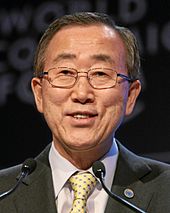
Bolivia, officially the Plurinational State of Bolivia, is a landlocked country located in western-central South America. It is bordered by Brazil to the north and east, Paraguay to the southeast, Argentina to the south, Chile to the southwest, and Peru to the west. The seat of government and administrative capital is La Paz, which contains the executive, legislative, and electoral branches of government, while the constitutional capital is Sucre, the seat of the judiciary. The largest city and principal industrial center is Santa Cruz de la Sierra, located on the Llanos Orientales, a mostly flat region in the east of the country.
Cryptome is an online library and 501(c)(3) private foundation created in 1996 by John Young and Deborah Natsios and closed in 2023. The site collected information about freedom of expression, privacy, cryptography, dual-use technologies, national security, intelligence, and government secrecy.
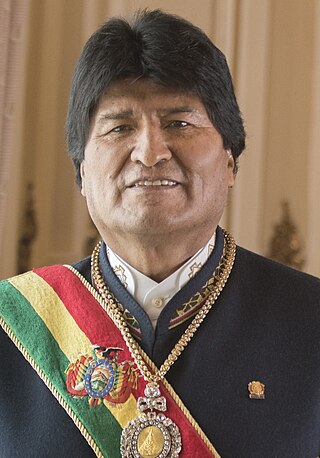
Juan Evo Morales Ayma is a Bolivian politician, trade union organizer, and former cocalero activist who served as the 65th president of Bolivia from 2006 to 2019. Widely regarded as the country's first president to come from its indigenous population, his administration worked towards the implementation of left-wing policies, focusing on the legal protections and socioeconomic conditions of Bolivia's previously marginalized indigenous population and combating the political influence of the United States and resource-extracting multinational corporations. Ideologically a socialist, he has led the Movement for Socialism (MAS) party since 1998.

The Union of South American Nations (USAN), sometimes also referred to as the South American Union, abbreviated in Spanish as UNASUR and in Portuguese as UNASUL, is an intergovernmental regional organization set up by Hugo Chavez to counteract the influence of the United States in the region. It once comprised twelve South American countries; as of 2019, most have withdrawn.

Bolivia–United States relations were established in 1837 with the first ambassadorial visit from the United States to Peru–Bolivian Confederation. The Confederation dissolved in 1839, and bilateral relations did not occur until 1848 when the United States recognized Bolivia as a sovereign state and appointed John Appleton as the Chargé d'Affaires.

The foreign policy of the Evo Morales administration concerns the policy initiatives made towards other states by the former President of Bolivia, in difference to past, or future, Bolivian foreign policy. Morales' foreign policy can be roughly divided between that of the Americas and the rest of the world.
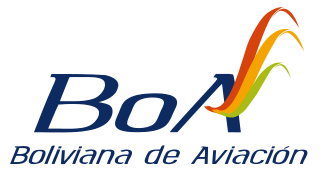
Boliviana de Aviación, legally incorporated as Empresa Pública Nacional Estratégica Boliviana de Aviación and commonly known as BoA, is the flag carrier airline of Bolivia and is wholly owned by the country's government. Founded in October 2007 and headquartered in Cochabamba, it operates most of its domestic network out of its primary hub at Jorge Wilstermann International Airport and maintains focus cities at El Alto International Airport and Viru Viru International Airport. Almost all international flights, including long-haul services to Madrid and Miami, operate out of Viru Viru airport in Santa Cruz de la Sierra due to the severe limitations of El Alto International Airport in La Paz, located over 4,000 metres (13,000 ft) above sea level.

Julian Paul Assange is an Australian computer programmer, editor, publisher, and activist who founded WikiLeaks in 2006. He came to wide international attention in 2010 when WikiLeaks published a series of leaks from US Army intelligence analyst Chelsea Manning: footage of a US airstrike in Baghdad, US military logs from the Afghanistan and Iraq wars, and US diplomatic cables.
WikiLeaks, a whistleblowing website founded by Julian Assange, has received praise as well as criticism from the public, hacktivists, journalist organisations and government officials. The organisation has revealed human rights abuses and was the target of an alleged "cyber war". Allegations have been made that Wikileaks worked with or was exploited by the Russian government and acted in a partisan manner during the 2016 U.S. presidential election.

The foreign policy of the Ollanta Humala concerns the policy initiatives made towards other states by the former President of Peru, in difference to past, or future, Peruvian foreign policy as represented by his Foreign Minister Rafael Roncagliolo. Humala's foreign policy was based on relations with other states of the Americas.
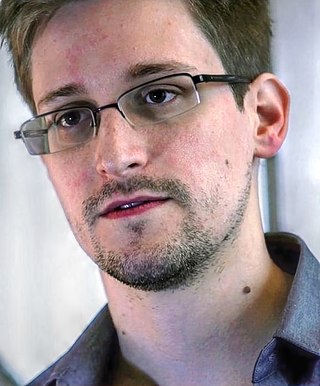
Edward Joseph Snowden is an American and naturalized Russian citizen who was a computer intelligence consultant and whistleblower who leaked highly classified information from the National Security Agency (NSA) in 2013 when he was an employee and subcontractor. His disclosures revealed numerous global surveillance programs, many run by the NSA and the Five Eyes intelligence alliance with the cooperation of telecommunication companies and European governments and prompted a cultural discussion about national security and individual privacy.

Bolivia–Mexico relations are the diplomatic relations between the Plurinational State of Bolivia and the United Mexican States. Both nations are members of the Community of Latin American and Caribbean States, Latin American Integration Association, Organization of American States, Organization of Ibero-American States and the United Nations. There is a community of approximately 10,000 Mexican citizens residing in Bolivia.
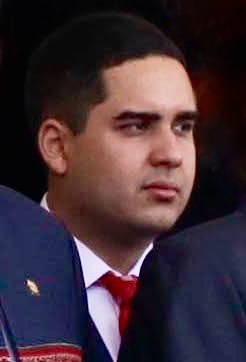
Nicolas Ernesto Maduro Guerra is a Venezuelan politician and the son of the President of Venezuela, Nicolás Maduro. He was appointed as Head of the Corps of Special Inspectors of the Presidency and Coordinator of the National Film School of Venezuela by his father. He was also elected by the PSUV party congress in 2014 to be the delegate of El Valle Capital District.

Bolivia–Cuba relations refers to the diplomatic relations between Bolivia and Cuba. Both nations are members of the United Nations, but relations of Bolivia with Cuba, like those of most countries in the Western Hemisphere with the notable exceptions of Canada and Mexico, have waxed and waned over the decades depending on geopolitical and regional political circumstances. Relations were good under Evo Morales, who shared the position of his like-minded left-wing allies in Nicaragua and Venezuela that Fidel Castro was a humanist and beloved icon of resistance to US hegemony in the Americas.

Bolivia–Spain relations are the current and historical relations between Bolivia and Spain. Both nations are members of the Association of Spanish Language Academies, Organization of Ibero-American States and the United Nations.

General elections were held in Bolivia on 20 October 2019. Voters elected all 130 members of the Chamber of Deputies and 36 senators and cast ballots for a joint slate of president and vice president. The Bolivian constitution allows the President and Vice-President to put themselves forward for re-election only once, limiting the number of terms to two, and the elections took place after in 2016 a referendum to amend the constitution was rejected, but that the Supreme Court of Justice ruled that all public offices would have no term limits despite what was established in the constitution and allowing Morales to run for a fourth term.

During the Venezuelan presidential crisis concerning the legitimate President of Venezuela, reactions and responses to the crisis were greatly divided.
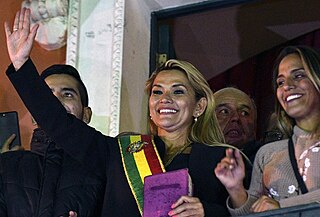
A political crisis occurred in Bolivia on 10 November 2019, after 21 days of civil protests following the disputed 2019 Bolivian general election in which incumbent President Evo Morales was initially declared the winner. The elections took place after a referendum to amend the Bolivian constitution, which limits the number of terms to two, was rejected in 2016. In 2017 under political pressure and a legal demand from the Morales government, the Constitutional Tribunal (TCP) ruled that all public offices would have no term limits despite what was established in the constitution and allowing Evo Morales to run for a fourth term.

Bolivia-Venezuela Relations are the existing bilateral relations between the Plurinational State of Bolivia and the Bolivarian Republic of Venezuela. Both nations established their diplomatic relations on 14 September 1883, during the government of the President of Bolivia Narciso Campero Leyes and the government of the President of Venezuela Antonio Guzmán Blanco.


